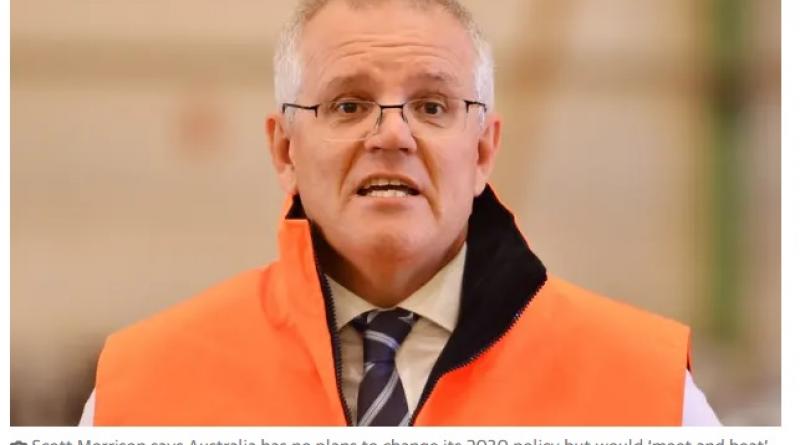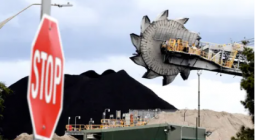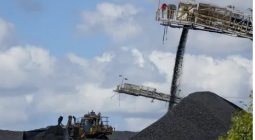Scott Morrison rules out more ambitious 2030 emissions target despite Cop26 pact

Prime minister says Australians will be working in the coal industry ‘for decades to come’
The prime minister, Scott Morrison, has ruled out adopting a more ambitious 2030 emissions reduction target, dismissing calls from moderate MPs who want Australia to revisit its commitment at next year’s UN climate summit.
Under the Glasgow pact arising from this month’s Cop26 summit, Australia was a signatory to a joint “request” for countries to re-examine and strengthen 2030 targets when countries return to the negotiating table at Cop27 in Egypt.
Morrison on Monday said Australia had no plans to change its policy but would “meet and beat” its Paris target of a 26% to 28% cut on 2005 emission levels. This was in line with a statement released on Sunday that described the 2030 target as “fixed”.
“We are going to achieve a 35% reduction in emissions by 2030. That is what we are going to achieve and that is what actually matters,” Morrison said on Monday.
“What matters is what you actually achieve. We are well above our target because our policy is to meet and beat, that is what we do.”
Australia was the only major developed country that refused to increase its 2030 emissions reduction targets at the Glasgow summit, rebuffing calls from allies and experts that stronger medium term targets are needed to prevent catastrophic global warming.
The NSW Liberal MP Dave Sharma said Australia should consider a target of 40% to 45% by 2035, building on Australia’s forecast of achieving a 35% reduction by 2030 – largely driven by state targets.
“It’s a modest stretch, but it’s not a big stretch,” Sharma told Sky News on Monday.
“Particularly when you consider the number of new technologies we’re investing in and the cost of things like battery storage that are coming down now at an exponential rate.”
Fellow moderates Jason Falinski, Katie Allen and Trent Zimmerman are also pushing for the government to revise its medium term target in the wake of the Glasgow resolution.
The Glasgow pact also included a resolution to “phase down” coal and accelerate efforts away from “unabated” coal power, but this clause was watered down after a push by the Indian delegation objected to the term “phase out”.
Sharma said the resolution indicated a clear shift “away from fossil fuels”, while Queensland Nationals senator Matt Canavan said the result was “a big green light for us to build more coal mines.”
The Nationals leader, Barnaby Joyce, said the government’s position on fossil fuels was clear, and Australia had different considerations as a major coal exporter.
“We will tell the Australian people quite clearly that if you stop using Australian coal, you’re just going to use more Indian coal or other coal from other parts of the world, from Indonesia, from Mongolia. And you’re going to get more emissions, not less,” Joyce said.
He said that shutting down Australia’s coal industry would lead to a drop in export earnings, a fall in the value of the Australian dollar and a rise in the cost of imports.
“If you start shutting that (coal) down, you of course are going to start shutting down your standard of living in Australia,” Joyce said.”
“We’re doing our part. We’ve always done our part, but we have to be tempered and understand quite clearly, you know, where our money … comes from.”
Morrison said he did not believe the Glasgow summit had been the “death knell” for the coal industry, saying there would be a transition but over a long period of time.
“For all those working in the industry in Australia, they will continue to work in the industry for decades to come,” Morrison said.
The Labor leader, Anthony Albanese, criticised the government for signing the Glasgow resolution but then refusing to consider a change to Australia’s 2030 target.
“I find it completely extraordinary that 24 hours after the federal government signed up to having a higher 2030 target in 2022, they’ve walked away from that commitment that they voluntarily signed up to in Glasgow,” Albanese said.
Albanese, who is expected to release Labor’s updated climate change policy later this month once the party resolves its position in the wake of the Glasgow summit, indicated Labor would be more ambitious than the Coalition.
“I’m confident that a Labor Government will tackle climate change and will join the world rather than being in the naughty corner,” he said.
“Labor will always engage with the world and will punch above our weight.”




